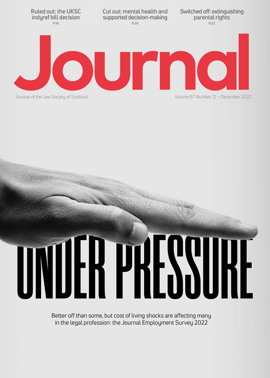Criminal court: Farewell retrospective

Farewell
It has been my privilege to produce this article every other month for the last 10 years and follow in the footsteps of the late, great wordsmith Petronius, aka Sheriff Andrew Lothian, and the former sheriff and academic Dr Charles Stoddart, who is still active updating Renton & Brown. That is my favoured book when on the bench if a legal problem on procedure, or indeed evidence (chapter 24), arises which I can’t deal with off the top of my head, or wish to give crisp, coherent reasons.
I am not sure if I matched up to my distinguished predecessors, but ably assisted by the excellent editorial support of Peter Nicholson, my wild drafts were tidied up into readable form for busy practitioners.
Rather than simply summarise recent cases and legislation, I have tried to include some comments drawn from my 45+ years of experience. I started out when the Criminal Procedure (Scotland) Act 1975 was brand new. A consolidation of its much amended 1995 successor is alas still some way off.
Most accused were young men aged 14 to 25, so called juvenile delinquents/young offenders, whereas nowadays the peak age of offending is 29 for men and 31 for women – those who have been left behind by their peers and struggle to get a roof over their heads, to bring drug and/or alcohol problems under control and perhaps re-engage with friends and family and even see their children again.
I leave you in the good hands of my Edinburgh colleague Sheriff Adrian Fraser. He has been my “go to” for recent tutorials in COVID law and practice, and has an encyclopaedic knowledge (as I once had) of Scottish criminal cases. I have told him to be bold and impart his knowledge and experience to you.
I am going to wind down a bit next year but may pop up now and again, as I care about our system and want it to be the envy of other legal systems as it was when I set out on my vocation in 1975.
Recent cases
There are not many cases to report this time. Have the appeal courts frightened potential litigants away, or does the recent case clearup mean more work will be forthcoming? In some cases I suspect that when accused are convicted and receive an immediate release from custody they just want to forget the whole mess.
The only decision I offer you is JH v HM Advocate [2022] HCJAC 39 (26 October 2022). The appellant was convicted of three charges of lewd, indecent and libidinous practices and behaviour. The first two involved sisters and took place at a time or times between January 1972 and April 1980/July 1981 respectively. A third charge libelled conduct between January 2000 and March 2003. On conviction the sheriff imposed 12 months’ imprisonment to cover the first two charges and 18 months consecutive on the third.
The complainers described a similar modus; the offences arose when they were aged seven, between eight and 12, and five or six years of age respectively. The appeal was taken because of the long time gap of 19 years before the third charge.
Reference was made to Duthie v HM Advocate 2021 JC 207 at para 28 where it states: “It is not the case that, as a matter of law, in a lengthy time gap case, there require to be special, compelling or extraordinary circumstances before the appropriate [Moorov] inference can be drawn.” The jury will “normally” be directed that the time, character and circumstances of the individual incidents are component parts of a course of conduct persistently pursued by the accused. It was argued this was a case where a particular direction had to be given.
The appeal was refused. The word “normally” had to be seen in the context of para 27 of Duthie. The Crown had argued that the conduct libelled had been particularly idiosyncratic and there had been evidence of a lack of opportunity.
I must say, when it was conceded there had been sufficient evidence to convict, the appeal was doomed standing the attitude of the Appeal Court in BL v HM Advocate [2022] HCJAC 15 – see the briefing at Journal, June 2022, 28 at 29.
When I started out, the period of time allowed between Moorov type incidents was less than three years: HM Advocate v AE 1937 JC 96; Ogg v HM Advocate 1938 JC 152. I remember my dismay as a young depute fiscal when the judge threw out a case at preliminary stage where a farmer had abused each of his three daughters between the ages of eight and puberty before moving on to the next one. There was a four year age difference between each girl.
While long time gaps seem to conflict with pursuing a course of conduct, clearly if DNA emerges linking an accused to two murders committed 20 years apart it should be a matter for the jury to decide on the evidence.
Death by driving
I trust that some of you practitioners have commented on the Scottish Sentencing Council’s draft guideline. I took part in an interesting and well attended webinar discussing the issues raised in these distressing and difficult cases.
While the draft follows recent Appeal Court jurisprudence rather than the English guidelines, I realised that the draft is not perfect in some areas. To my mind there is a significant difference between ignoring a STOP sign and failing to give way. Death by dangerous driving will almost inevitably result in a custodial sentence, whereas death by careless driving may not. The maximum penalty for the latter is however five years’ imprisonment.
 It will be interesting to see the court’s disposal in a recent case of multiple deaths including the accused’s young child.
It will be interesting to see the court’s disposal in a recent case of multiple deaths including the accused’s young child.
Restorative justice as reimagined by the Scottish Government is sadly still some years off, but the Sentencing Council’s Principles and Purposes of Sentencing, approved in November 2018, includes: “Giving the offender the opportunity to make amends. Sentencing acknowledges the harm caused to victims and communities. Sentencing may also aim to recognise and meet the needs of victims and communities by requiring the offender to repair at least some of the harm caused.”
I use this provision to require accused persons at sentencing stage to produce in their own words a statement of the incident that may be compared to any victim impact statement produced on behalf of the deceased, so that it may be offered to the family and perhaps answer some of the questions the criminal process rarely addresses.
That process enables me as a sentencer to examine in detail the extent of any remorse that is expressed on the accused’s behalf.
Drug deaths
I couldn’t leave you without an update on this topic, which I last covered at Journal, August 2022, 28. I managed many drug treatment and testing orders from 2002 to 2019 and believed in the system. When COVID came along and face-to-face interviews and regular testing became impossible, many addicts struggled even further.
In recent years I had noticed a change, with addicts being moved on by dealers from heroin to the even more problematic crack cocaine, and the growth of street Valium which could be acquired in vast quantities online and contained all sorts of chemicals. To this mix can be added strong medications such as OxyContin, Fentanyl and Gabapentin, which are illegally dealt and consumed, often with drastic results.
Recent figures from the delayed Drug Deaths Task Force suggest small gains, but a better world is not promised until 2026 when there will be capacity “for at least 1,000 people to be publicly funded to go to rehab every year”.
This is out of an estimated 60,000 addicts in Scotland.
In 2021, 1,330 people lost their lives to illicit drugs, 1% lower than the 2020 high. Police figures for 2022 suggest a greater reduction, but these fatalities vary from area to area. The peak age for mortality is between 35 and 54, and 70% of those deaths are men. From my parochial perspective at Edinburgh, drug deaths rose from 92 to 109 last year, which is an indicator of what can happen when support suddenly stops. No new drug treatment and testing orders can be made at Edinburgh Sheriff Court as the service does not have a doctor.
Those with problems are left to access a few drop-in centres and charitable initiatives which in turn are subject to uncertain funding.
It is worth looking at the Blueprint to Save Lives report of advocacy group The Faces and Voices of Recovery (“FAVOR”) for another perspective, which suggests almost no progress towards reducing mortality rates. A Right to Addiction Recovery (Scotland) Bill was proposed by the Scottish Conservatives last year and its introduction is now awaited.
If we take the peak age of offending (see above) and the peak age of drug mortality, there are only a few years to work intensively with this group to stabilise them and provide them with decent accommodation, hoping to reintegrate them back into their families and the community. If you are unsympathetic to this, think of their children who will be left behind.
Beyond Newspeak
My draft articles could have been better written, and although an average pupil at school, I enjoyed Orwell’s essays and his wish for plain English and short sentences: see Politics and the English Language (1946).
This is very much the judicial way nowadays, with less Latin phraseology, although you still have to tell the jury about the res gestae (the incident in question), de recenti (stuff said shortly afterwards), and mens rea, the guilty mind, which previously had to be inferred from actions and adminicles of evidence but nowadays can often be readily gleaned from the accused’s contemporaneous social media posts.
Once we marvelled at how Lord Denning could begin a judgment with: “In summertime village cricket is a delight to everyone. In the village of Lintz in the County of Durham they have their own ground, where they have played these last 70 years” (Miller v Jackson [1977] QB 966 at 976). You knew in the first paragraph that the developers had lost their case. Lord Denning was of his time and said many things which would not be acceptable nowadays.
I wish to place on record some irritating phrases. George Orwell might have described them as Newspeak, but in the intervening years things have deteriorated and this selection goes beyond jargon and euphemisms.
“Flat cash settlement until April 2027.” This is the most spectacular piece of non-Government I have come across. Any dictionary will tell you a settlement is “an official agreement intended to resolve a dispute or conflict”. Instead this was an imposition, after which we heard nothing from the Justice Minister for a long time. He seems disinclined to discuss the reality on the ground, among frontline police officers, with lawyers working in the courts, among social workers trying to deliver community sentences and with prison staff trying to manage too many remand prisoners, who even if convicted may receive backdated sentences far shorter than the time served.
I remember the court strikes of 1979 and 1981, each lasting about three months. In Glasgow thousands of cases were abandoned. To my amazement I realised being a prosecutor was not as crucial a role as I had thought – for a short time anyway. The English have had a 15% settlement on a much higher baseline than Scotland ever had. All criminal justice agencies have said the Scottish “settlement” is unsustainable. Those in the system have worked hard to clear cases, but the longer this facade goes on, the lack of defence agents will stall plans to clear things up in time for the next Scottish elections in 2026. Surely something will have to be done in the Scottish Government’s December statement. We are told there is £50 million to clear up the jury backlog, but there is unlikely to be the capacity to process these cases.
After years of neglect and little in the way of planning after the “Early Years” and “Getting It Right for Every Child” primary school initiatives, we had the complete failure of the “looked after” system for those brought up in care. They were later abandoned to an unsupervised tenancy at 16, which they lost soon afterwards due to lack of support and training and ended up homeless. Such persons are now blithely described as having “care experience”, which glosses over the abuse and deprivation many suffered and the complete lack of care they received.
It is very difficult to try to get it right for an accused in court facing minor criminal charges when they represent the tip of an iceberg of years of neglect and abuse.
I pass no comment on the Gender Recognition Reform (Scotland) Bill which is wending its way through the Scottish Parliament, but I would be concerned about men who apply for gender recognition so as to gain access to women in prison and other vulnerable situations. I hope consideration will be given to the concept hitherto dismissed as a “few bad faith actors”.
The Journal is in turn very grateful to Sheriff Crowe for sharing his experience and insight over the years he has been contributing this briefing. – Editor
Perspectives
Features
Briefings
- Criminal court: Farewell retrospective
- Agriculture: A future support framework
- Corporate: Is there a creditor duty?
- Intellectual property: "Reclaiming the UK statute book"
- Sport: Flouting their own rules?
- Succession: Crofting tenancy transfers in intestacy
- Scottish Solicitors' Discipline Tribunal: December 2022
- Property: Conveyancing – the future is in our hands
- In-house: With a fair wind







